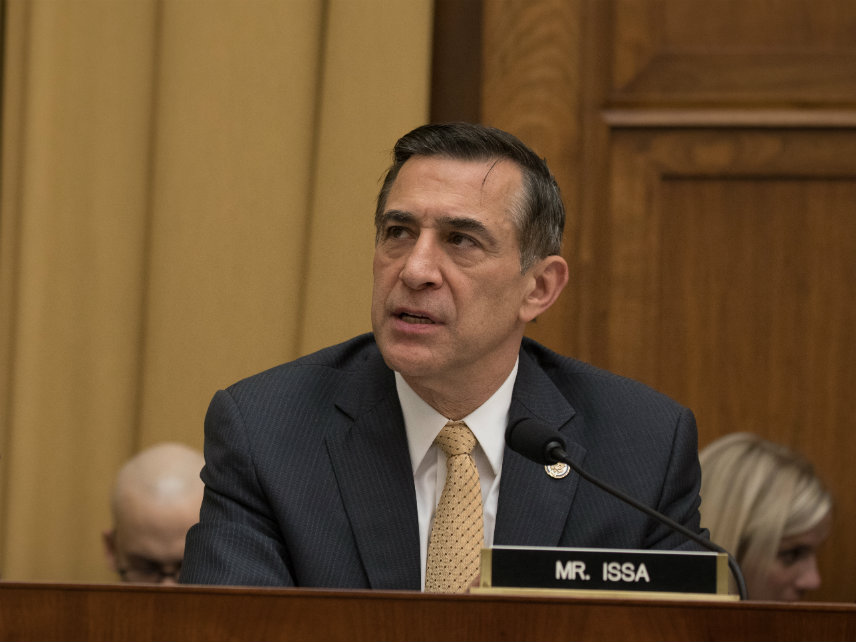Yes, Licensing Boards Are Cartels
The case for why Congress should get involved.

Licensing boards are perhaps the most powerful labor institution in American history.
The best estimates available suggest that roughly 30 percent of American workers are now required to get a license from one of those quasi-government agencies before they can enter the workforce. That's about the same percentage of the workforce that was a member of a union in the 1950s, the decade when union membership peaked before falling off to about half that percentage today.
There's no debate about whether the federal government has a role to play in regulating the activities of labor unions, of course. Should Congress do something about licensing boards?
"I think federal interest in this is really important," says Rebecca Allensworth, a professor of law at Vanderbilt University.
The "dirty secret behind licensing boards," Allensworth told the House Judiciary Committee on Tuesday afternoon, is that very little of what they do resembles government activity. While growing to become the largest labor institution in American history, they have too often become a self-serving institutions that act like cartels instead of protectors of public health and safety.
In research she published last year, Allensworth looked at all 1,790 state occupational licensing boards operating in America. Of those, she found that 1,515 (85 percent) of them were required by state statute to be comprised of a majority of currently licensed professionals in the same field.
"These boards are formed, by law, as cartels," Allensworth said Tuesday.
State legislatures have increasingly outsourced professional regulation to licensing boards, and in theory that's not necessarily a bad idea. Professionals working in a given field are likely to have more expertise about what rules might be needed. But in exchange for expertise, states have created the potential for professional self-dealing.
And that's not just theoretical. It's very real. In North Carolina, for example, a board comprised by a majority of actively practicing dentists decided in 2012 to send cease-and-desist letters to kiosks offering teeth whitening services. The practice of whitening teeth, the board declared, could only be done by licensed dentists.
In that instance, the Federal Trade Commission intervened. The whole case wound up in the Supreme Court, which ruled in 2015 that licensing boards controlled by a majority of "active market participants" could not make deliberately anticompetitive rules, unless those boards were "actively supervised" by some other element of state government.
Some states have responded to the Supreme Court ruling by changing how their boards operate, but the North Carolina Board of Dental Examiners v. FTC case created more questions than answers.
That's why Congress is now getting involved. In July, Rep. Darrell Issa (R-Calif.), along with three Republican senators, introduced the Restoring Board Immunity Act to clarify how state licensing boards need to be structured in order to avoid potentially expensive lawsuits challenging boards' anticompetitive rules.
"You want them to be public entities, but virtually no states prohibit them from self-dealing," Issa said Tuesday during the hearing on the bill. Lawmakers would have recuse themselves from voting on legislation that affects their own businesses, but there is no such requirement for members of licensing boards, he pointed out.
In the end, licensing issues will be settled at the state level. Issa's bill is merely intended to steer states towards potential solutions to the problems created by the 2015 Supreme Court ruling. Among other things, states would have to pass legislation requiring lawmakers to conduct comprehensive reviews of their licensing boards every five years. Those would include a cost/benefit analysis and an assessment of any new licensing rules created since the last review.
There are federalism concerns about the RBI Act. Congress would be nudging states towards certain behavior with the carrot of immunity from antitrust lawsuit. Sarah Allen, a deputy attorney general in Virginia, said Tuesday that many states might be unwilling to make the changes suggested by Issa's bill, and would perhaps rather "take their chances" in court against potential anti-trust lawsuits like the one brought against the dental board in North Carolina.
The real problem, says Allensworth, is the regulatory infrastructure that has built up over the decades. There's almost unanimous, bipartisan agreement that licensing reform must be undertaken—good luck finding many other issues where Issa agrees with something the Obama administration said—yet the number of licensing laws continues to grow and more workers than ever before must get a government-issues permission slip before going to work.
The RBI act would make licensing regulations a function of the state government, the way they should be, Allensworth said, though she had a mixed opinion of some of the bill's provisions—including one element that would make it easier for workers and businesses to take licensing boards to court over disagreements.
"I want the state to take governmental responsibility for the regulation they create," she says. "Once states know the lay of the land, they will be able to balance the competitive costs of regulations themselves."


Show Comments (10)